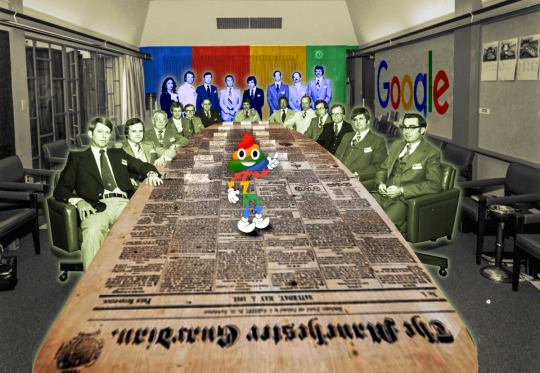#digital markets
Explore tagged Tumblr posts
Text

2 notes
·
View notes
Text

Somebody call for viet miku?
#she’s on her way to the market to haggle for lower leek prices#hatsune miku#vocaloid#vocaloid fanart#hatsune miku fanart#miku around the world#viet miku#artists on tumblr#digital art#miku worldwide#shroomer's art !#MY WIFEEEEE MIKUUUU
12K notes
·
View notes
Text
“Reject All” cookie consent update
On 9 August 2023, the UK Information Commissioner’s Office (ICO) and the UK Competition & Markets Authority (CMA) jointly published a position paper on harmful design practices in digital markets, particularly focusing on cookie consent banners. The paper clarifies the ICO’s stance on the “Reject All” button in these banners. Key points from the paper include: Equal Ease for Consent Choices:…

View On WordPress
#CMA regulations#consent choices#cookie banners#cookie consent#cookie policy#data protection laws#digital markets#digital platform compliance#fair consent mechanisms#GDPR compliance#harmful design practices#ICO guidance#non-essential cookies#nudge techniques#PECR compliance#Privacy and Electronic Communications Regulations#Reject All button#reject all cookies#sludge techniques#transparent consent#UK GDPR Article 4(11)#UK GDPR Article 5(1)(a)#user privacy rights
1 note
·
View note
Text
The European Commission announced today the launch of several investigations to determine whether Apple, Google, and Meta still fail to comply with the Digital Markets Act
0 notes
Text




#art#artists on tumblr#digital art#one piece#sanji#zoro#roronoa zoro#black leg sanji#vinsmoke sanji#market#groceries#zosan
7K notes
·
View notes
Text


#the amazing digital circus#digital circus#gator#alligator#gummigoo#marketable plushies#glitch productions#gif#gooseworx
6K notes
·
View notes
Text

sketching for pocky day!! wish i had more time... 🥹
also, trying to figure out a style for "quick" art is hard. this was literally my "concept" sketch, but i was so physically fatigued to lineart, help- i was FIGHTING the sleep LOL
#i grew up eating pocky as a small kid everytime my mom would need to shop at the asian market for our cultural food items lmao#SUPER NOSTALGIC love pocky forever#my art#fanart#spy x family#art#anime#spy x family fanart#twiyor#animeart#digital art#loid forger#yor forger
2K notes
·
View notes
Text

hello kitty, you're so silly!
ko-fi☕ shop🥪 redbubble💌
#viks art#digital drawing#poolverine#spideypool#digital art#hello kitty#fanart#deadpool 3#deadpool and wolverine#dp3#dp&w#spideywolverpool#<- is that the name#clip studio paint#artists on tumblr#my art#they're so... marketable....#peter parker#wade wilson#logan howlett
2K notes
·
View notes
Text

May You Find The Solace You Seek
#AHHH SUNDAY DRIP MARKETING#I dropped everything to draw this ouahhhhggg….#my jades are so screwed u guys#art#digital art#artists on tumblr#honkai star rail#hsr#hsr fanart#sunday hsr#sunday#sevvsart
2K notes
·
View notes
Text
URGENT APPEAL !!!!
🍉🍉Save the life of the child Malak "who suffers from Down Syndrome"🍉🍉
Hello, my name is Doaa, and I'm reaching out on behalf of my beloved daughter Malak , who is a 3-year-old girl born with Down syndrome. Despite war hardships, Malak always had her safe haven - her home, where she received the care and attention she deserved.

However, the ongoing war in Gaza has turned our world upside down. We've been forced to flee our home, leaving behind everything, including her treasured belongings and familiar routines. As a child with Down syndrome, the upheaval and uncertainty of these drastic changes have taken a profound toll on her.

Life became very hard,prices have escalated, clean water is a dream.After displacing to the south ,and the destruction of our beloved house and the loss of all what we have ever worked for, we now live in a tent.With winter on the way,as a mum , I'm terrified on my daughter's health condition as she was born with a weak heart.No enough blankets, air is strong,cold is freezing.She is always sick.


It breaks my heart to see her struggle each day amidst the chaos of war. With medical supplies and necessities scarce in Gaza, it's become increasingly challenging to provide Malak with the care and support she needs and deserves. That's why I'm reaching out to you today.

No one knows what it truly means to face shock in complete silence,to smile in face of situations that invite tears,and no one realizes what it feels like to boil inside while standing at the peak of steadfastness.Behind this apparent strength lies a deep suffering that no one can grasp.My heart is slowly torn apart under the weight of suppressed pain.Life forces me to pretend to be strong,when apart of me fades away with each moment.I'm left with a bitter feeling of isolation and loneliness.Please don't leave my daughter alone face the struggle of the gloomy war, starvation,pollution and lack of medicine.

I'm starting this GoFundMe campaign with one simple plea: help us provide to Malak medicine and pampers.Your donations facilitate Malak's life;she can receive the medical attention and care she urgently requires Every donation, no matter how small, will make a world of difference in her life.

Please, let's come together as a community and make her life a little easier. Your kindness and generosity will not only bring hope to Malak but also provide our family with the reassurance that she is,to some extent ,safe and well-cared for. Thank you from the bottom of our hearts for your support and compassion during this incredibly challenging time.
The campaign was documented by @90-ghost
@gaza-evacuation-funds
@@90-ghost @nabulsi @theclowninghour @wetsweatgym @creating-something-stuff @kryaaas @gazavetters @gaza-evacuation-funds @gaddisjamiu @staff @ruffffffing @wetsweatgym @teresamerandi @gazikacmislaflar @equipo @palesttino
#art#digital art#donations#marketing#my art#nail art#palestinian lives matter#donald trump#donate if you can#free gaza#gazaunderattack#@na motivation#help gaza#gaza strip#gaza genocide#palestine genocide#girlblogging#justice for palestine#palestine donation#down syndrome#angel#cotl kallamar#dykeposting
1K notes
·
View notes
Text

wizard husbands go to the farmers market
#wizard#illustration#wizardcore#illustrators on tumblr#digital art#lgbtq#gay#artists on tumblr#artwork#drawing#theartofmadeline#im not super happy with how this came out BUT#i had the concept and i did it#so that makes it good#ANYWAYS they are gay and at the wizard market !!!#every gay couple has one person who cant stop buying things#and one person who has to hold all the shit they buy#eyes off of the red wizards big naturals !!#wizard posting#wizard blogging
8K notes
·
View notes
Text
What is your favorite thing to get at your local farmers market? 🍊🍊🍊

#farmers market#frogs#flowers#plants#illustration#cute#procreate#kid lit illustration#digital artist#digitalart
464 notes
·
View notes
Text

chimata decora :3
#chimata tenkyuu#the new chimata fumo is so cuteeee...#drawing the animal spirits took foreverr#touhou#2hu#digital art#my art#touhou fanart#unconnected marketeers#th 18#chimata fanart#decora kei#decora fashion#rainbow
629 notes
·
View notes
Text

a redraw of this
#i made it to be a print that i'm gonna sell at a local art market im tabling at#vaporeon#pokemon#pkmn fanart#pkmn#pkmnart#pokemon art#digital art#illustration#myart#art#pokemon fanart
207 notes
·
View notes
Text
UK publishers suing Google for $17.4b over rigged ad markets

THIS WEEKEND (June 7–9), I'm in AMHERST, NEW YORK to keynote the 25th Annual Media Ecology Association Convention and accept the Neil Postman Award for Career Achievement in Public Intellectual Activity.

Look, no one wants to kick Big Tech to the curb more than I do, but, also: it's good that Google indexes the news so people can find it, and it's good that Facebook provides forums where people can talk about the news.
It's not news if you can't find it. It's not news if you can't talk about it. We don't call information you can't find or discuss "news" – we call it "secrets."
And yet, the most popular – and widely deployed – anti-Big Tech tactic promulgated by the news industry and supported by many of my fellow trustbusters is premised on making Big Tech pay to index the news and/or provide a forum to discuss news articles. These "news bargaining codes" (or, less charitably, "link taxes") have been mooted or introduced in the EU, France, Spain, Australia, and Canada. There are proposals to introduce these in the US (through the JCPA) and in California (the CJPA).
These US bills are probably dead on arrival, for reasons that can be easily understood by the Canadian experience with them. After Canada introduced Bill C-18 – its own news bargaining code – Meta did exactly what it had done in many other places where this had been tried: blocked all news from Facebook, Instagram, Threads, and other Meta properties.
This has been a disaster for the news industry and a disaster for Canadians' ability to discuss the news. Oh, it makes Meta look like assholes, too, but Meta is the poster child for "too big to care" and is palpably indifferent to the PR costs of this boycott.
Frustrated lawmakers are now trying to figure out what to do next. The most common proposal is to order Meta to carry the news. Canadians should be worried about this, because the next government will almost certainly be helmed by the far-right conspiratorialist culture warrior Pierre Poilievre, who will doubtless use this power to order Facebook to platform "news sites" to give prominence to Canada's rotten bushel of crypto-fascist (and openly fascist) "news" sites.
Americans should worry about this too. A Donald Trump 2028 presidency combined with a must-carry rule for news would see Trump's cabinet appointees deciding what is (and is not) news, and ordering large social media platforms to cram the Daily Caller (or, you know, the Daily Stormer) into our eyeballs.
But there's another, more fundamental reason that must-carry is incompatible with the American system: the First Amendment. The government simply can't issue a blanket legal order to platforms requiring them to carry certain speech. They can strongly encourage it. A court can order limited compelled speech (say, a retraction following a finding of libel). Under emergency conditions, the government might be able to compel the transmission of urgent messages. But there's just no way the First Amendment can be squared with a blanket, ongoing order issued by the government to communications platforms requiring them to reproduce, and make available, everything published by some collection of their favorite news outlets.
This might also be illegal in Canada, but it's harder to be definitive. The Canadian Charter of Rights and Freedoms was enshrined in 1982, and Canada's Supreme Court is still figuring out what it means. Section Two of the Charter enshrines a free expression right, but it's worded in less absolute terms than the First Amendment, and that's deliberate. During the debate over the wording of the Charter, Canadian scholars and policymakers specifically invoked problems with First Amendment absolutism and tried to chart a middle course between strong protections for free expression and problems with the First Amendment's brook-no-exceptions language.
So maybe Canada's Supreme Court would find a must-carry order to Meta to be a violation of the Charter, but it's hard to say for sure. The Charter is both young and ambiguous, so it's harder to be definitive about what it would say about this hypothetical. But when it comes to the US and the First Amendment, that's categorically untrue. The US Constitution is centuries older than the Canadian Charter, and the First Amendment is extremely definitive, and there are reams of precedent interpreting it. The JPCA and CJPA are totally incompatible with the US Constitution. Passing them isn't as silly as passing a law declaring that Pi equals three or that water isn't wet, but it's in the neighborhood.
But all that isn't to say that the news industry shouldn't be attacking Big Tech. Far from it. Big Tech compulsively steals from the news!
But what Big Tech steals from the news isn't content.
It's money.
Big Tech steals money from the news. Take social media: when a news outlet invests in building a subscriber base on a social media platform, they're giving that platform a stick to beat them with. The more subscribers you have on social media, the more you'll be willing to pay to reach those subscribers, and the more incentive there is for the platform to suppress the reach of your articles unless you pay to "boost" your content.
This is plainly fraudulent. When I sign up to follow a news outlet on a social media site, I'm telling the platform to show me the things the news outlet publishes. When the platform uses that subscription as the basis for a blackmail plot, holding my desire to read the news to ransom, they are breaking their implied promise to me to show me the things I asked to see:
https://www.eff.org/deeplinks/2023/06/save-news-we-need-end-end-web
This is stealing money from the news. It's the definition of an "unfair method of competition." Article 5 of the Federal Trade Commission Act gives the FTC the power to step in and ban this practice, and they should:
https://pluralistic.net/2023/01/10/the-courage-to-govern/#whos-in-charge
Big Tech also steals money from the news via the App Tax: the 30% rake that the mobile OS duopoly (Apple/Google) requires for every in-app purchase (Apple/Google also have policies that punish app vendors who take you to the web to make payments without paying the App Tax). 30% out of every subscriber dollar sent via an app is highway robbery! By contrast, the hyperconcentrated, price-gouging payment processing cartel charges 2-5% – about a tenth of the Big Tech tax. This is Big Tech stealing money from the news:
https://www.eff.org/deeplinks/2023/06/save-news-we-must-open-app-stores
Finally, Big Tech steals money by monopolizing the ad market. The Google-Meta ad duopoly takes 51% out of every ad-dollar spent. The historic share going to advertising "intermediaries" is 10-15%. In other words, Google/Meta cornered the market on ads and then tripled the bite they were taking out of publishers' advertising revenue. They even have an illegal, collusive arrangement to rig this market, codenamed "Jedi Blue":
https://en.wikipedia.org/wiki/Jedi_Blue
There's two ways to unrig the ad market, and we should do both of them.
First, we should trustbust both Google and Meta and force them to sell off parts of their advertising businesses. Currently, both Google and Meta operate a "full stack" of ad services. They have an arm that represents advertisers buying space for ads. Another arm represents publishers selling space to advertisers. A third arm operates the marketplace where these sales take place. All three arms collect fees. On top of that: Google/Meta are both publishers and advertisers, competing with their own customers!
This is as if you were in court for a divorce and you discovered that the same lawyer representing your soon-to-be ex was also representing you…while serving as the judge…and trying to match with you both on Tinder. It shouldn't surprise you if at the end of that divorce, the court ruled that the family home should go to the lawyer.
So yeah, we should break up ad-tech:
https://www.eff.org/deeplinks/2023/05/save-news-we-must-shatter-ad-tech
Also: we should ban surveillance advertising. Surveillance advertising gives ad-tech companies a permanent advantage over publishers. Ad-tech will always know more about readers' behavior than publishers do, because Big Tech engages in continuous, highly invasive surveillance of every internet user in the world. Surveillance ads perform a little better than "content-based ads" (ads sold based on the content of a web-page, not the behavior of the person looking at the page), but publishers will always know more about their content than ad-tech does. That means that even if content-based ads command a slightly lower price than surveillance ads, a much larger share of that payment will go to publishers:
https://www.eff.org/deeplinks/2023/05/save-news-we-must-ban-surveillance-advertising
Banning surveillance advertising isn't just good business, it's good politics. The potential coalition for banning surveillance ads is everyone who is harmed by commercial surveillance. That's a coalition that's orders of magnitude larger than the pool of people who merely care about fairness in the ad/news industries. It's everyone who's worried about their grandparents being brainwashed on Facebook, or their teens becoming anorexic because of Instagram. It includes people angry about deepfake porn, and people angry about Black Lives Matter protesters' identities being handed to the cops by Google (see also: Jan 6 insurrectionists).
It also includes everyone who discovers that they're paying higher prices because a vendor is using surveillance data to determine how much they'll pay – like when McDonald's raises the price of your "meal deal" on your payday, based on the assumption that you will spend more when your bank account is at its highest monthly level:
https://pluralistic.net/2024/06/05/your-price-named/#privacy-first-again
Attacking Big Tech for stealing money is much smarter than pretending that the problem is Big Tech stealing content. We want Big Tech to make the news easy to find and discuss. We just want them to stop pocketing 30 cents out of every subscriber dollar and 51 cents out of ever ad dollar, and ransoming subscribers' social media subscriptions to extort publishers.
And there's amazing news on this front: a consortium of UK web-publishers called Ad Tech Collective Action has just triumphed in a high-stakes proceeding, and can now go ahead with a suit against Google, seeking damages of GBP13.6b ($17.4b) for the rigged ad-tech market:
https://www.reuters.com/technology/17-bln-uk-adtech-lawsuit-against-google-can-go-ahead-tribunal-rules-2024-06-05/
The ruling, from the Competition Appeal Tribunal, paves the way for a frontal assault on the thing Big Tech actually steals from publishers: money, not content.
This is exactly what publishing should be doing. Targeting the method by which tech steals from the news is a benefit to all kinds of news organizations, including the independent, journalist-owned publishers that are doing the best news work today. These independents do not have the same interests as corporate news, which is dominated by hedge funds and private equity raiders, who have spent decades buying up and hollowing out news outlets, and blaming the resulting decline in readership and profits on Craiglist.
You can read more about Big Finance's raid on the news in Margot Susca's Hedged: How Private Investment Funds Helped Destroy American Newspapers and Undermine Democracy:
https://www.press.uillinois.edu/books/?id=p087561
You can also watch/listen to Adam Conover's excellent interview with Susca:
https://www.youtube.com/watch?v=N21YfWy0-bA
Frankly, the looters and billionaires who bought and gutted our great papers are no more interested in the health of the news industry or democracy than Big Tech is. We should care about the news and the workers who produce the news, not the profits of the hedge-funds that own the news. An assault on Big Tech's monetary theft levels the playing field, making it easier for news workers and indies to compete directly with financialized news outlets and billionaire playthings, by letting indies keep more of every ad-dollar and more of every subscriber-dollar – and to reach their subscribers without paying ransom to social media.
Ending monetary theft – rather than licensing news search and discussion – is something that workers are far more interested in than their bosses. Any time you see workers and their bosses on the same side as a fight against Big Tech, you should look more closely. Bosses are not on their workers' side. If bosses get more money out of Big Tech, they will not share those gains with workers unless someone forces them to.
That's where antitrust comes in. Antitrust is designed to strike at power, and enforcers have broad authority to blunt the power of corporate juggernauts. Remember Article 5 of the FTC Act, the one that lets the FTC block "unfair methods of competition?" FTC Chair Lina Khan has proposed using it to regulate training AI, specifically to craft rules that address the labor and privacy issues with AI:
https://www.youtube.com/watch?v=3mh8Z5pcJpg
This is an approach that can put creative workers where they belong, in a coalition with other workers, rather than with their bosses. The copyright approach to curbing AI training is beloved of the same media companies that are eagerly screwing their workers. If we manage to make copyright – a transferrable right that a worker can be forced to turn over their employer – into the system that regulates AI training, it won't stop training. It'll just trigger every entertainment company changing their boilerplate contract so that creative workers have to sign over their AI rights or be shown the door:
https://pluralistic.net/2024/05/13/spooky-action-at-a-close-up/#invisible-hand
Then those same entertainment and news companies will train AI models and try to fire most of their workers and slash the pay of the remainder using those models' output. Using copyright to regulate AI training makes changes to who gets to benefit from workers' misery, shifting some of our stolen wages from AI companies to entertainment companies. But it won't stop them from ruining our lives.
By contrast, focusing on actual labor rights – say, through an FTCA 5 rulemaking – has the potential to protect those rights from all parties, and puts us on the same side as call-center workers, train drivers, radiologists and anyone else whose wages are being targeted by AI companies and their customers.
Policy fights are a recurring monkey's paw nightmare in which we try to do something to fight corruption and bullying, only to be outmaneuvered by corrupt bullies. Making good policy is no guarantee of a good outcome, but it sure helps – and good policy starts with targeting the thing you want to fix. If we're worried that news is being financially starved by Big Tech, then we should go after the money, not the links.

If you'd like an essay-formatted version of this post to read or share, here's a link to it on pluralistic.net, my surveillance-free, ad-free, tracker-free blog:
https://pluralistic.net/2024/06/06/stealing-money-not-content/#content-free
#pluralistic#competition#advertising#surveillance advertising#saving the news from big tech#link taxes#trustbusting#competition and markets authority#uk#ukpoli#Ad Tech Collective Action#digital markets unit#Competition Appeal Tribunal
584 notes
·
View notes